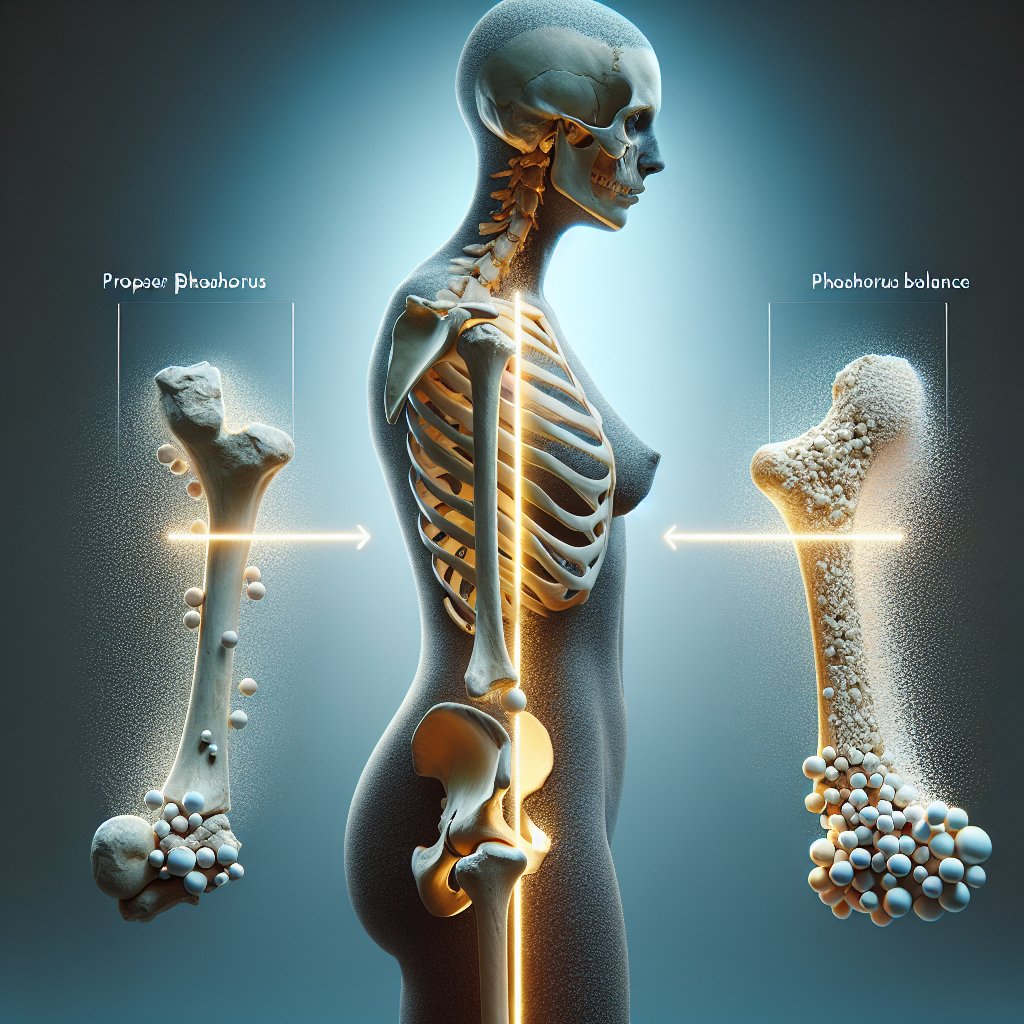The balance of phosphorus is crucial for optimal bone growth and development, playing a significant role in maintaining skeletal health. Phosphorus, an essential mineral, works in conjunction with calcium to form the structural framework of bones. Understanding the importance of phosphorus balance can help in preventing various bone-related disorders and ensuring overall health. This article will explore the role of phosphorus in bone growth, the consequences of imbalances, and strategies for maintaining optimal phosphorus levels.
The Role of Phosphorus in Bone Growth
Phosphorus is the second most abundant mineral in the human body, with approximately 85% of it found in bones and teeth. It is a key component of hydroxyapatite, the mineral complex that gives bones their strength and rigidity. The relationship between phosphorus and calcium is particularly important; these two minerals work together to form a stable bone matrix. A proper balance between phosphorus and calcium is essential for effective bone mineralization.
Phosphorus is involved in several biological processes that are vital for bone health:
- Bone Mineralization: Phosphorus combines with calcium to form hydroxyapatite crystals, which are deposited in the bone matrix, providing structural integrity.
- Energy Metabolism: Phosphorus is a component of adenosine triphosphate (ATP), the energy currency of cells. Adequate energy is necessary for the activity of osteoblasts, the cells responsible for bone formation.
- Regulation of Hormones: Phosphorus plays a role in the regulation of parathyroid hormone (PTH) and vitamin D, both of which are critical for calcium homeostasis and bone health.
- Cell Signaling: Phosphorus is involved in various signaling pathways that influence bone remodeling and growth.
Given these roles, it is clear that phosphorus is indispensable for bone growth and maintenance. However, the balance between phosphorus and other nutrients, particularly calcium, is equally important to ensure optimal bone health.
Consequences of Phosphorus Imbalance
Both phosphorus deficiency and excess can lead to significant health issues, particularly concerning bone health. Understanding these consequences is essential for recognizing the importance of maintaining a proper phosphorus balance.
Phosphorus Deficiency
A deficiency in phosphorus, although rare, can occur due to inadequate dietary intake, malabsorption disorders, or certain medical conditions. The consequences of phosphorus deficiency include:
- Bone Weakness: Insufficient phosphorus can lead to decreased bone mineral density, making bones more susceptible to fractures and osteoporosis.
- Impaired Growth: In children and adolescents, phosphorus deficiency can result in stunted growth and developmental delays.
- Muscle Weakness: Phosphorus is essential for energy production; a deficiency can lead to muscle weakness and fatigue.
- Rickets and Osteomalacia: In severe cases, phosphorus deficiency can contribute to conditions like rickets in children and osteomalacia in adults, characterized by soft and weak bones.
Phosphorus Excess
On the other hand, excessive phosphorus intake, often due to high consumption of processed foods and phosphate additives, can also have detrimental effects on bone health:
- Calcium Imbalance: High phosphorus levels can lead to decreased calcium absorption, resulting in a condition known as secondary hyperparathyroidism, where the parathyroid glands produce excess hormone to compensate for low calcium levels.
- Bone Loss: Chronic high phosphorus levels can lead to increased bone resorption, where osteoclasts break down bone tissue, leading to a decrease in bone density.
- Cardiovascular Issues: Excess phosphorus has been linked to vascular calcification, which can increase the risk of cardiovascular diseases.
Maintaining a proper balance of phosphorus is essential for preventing these health issues. It is important to monitor dietary intake and be aware of the sources of phosphorus in the diet.
Strategies for Maintaining Optimal Phosphorus Levels
To ensure a healthy phosphorus balance, individuals should focus on dietary choices, lifestyle factors, and regular health check-ups. Here are some strategies to consider:
1. Balanced Diet
A well-balanced diet is the cornerstone of maintaining optimal phosphorus levels. Foods rich in phosphorus include:
- Dairy Products: Milk, cheese, and yogurt are excellent sources of phosphorus and calcium.
- Meat and Fish: Poultry, beef, pork, and fish are high in phosphorus.
- Nuts and Seeds: Almonds, sunflower seeds, and pumpkin seeds provide healthy fats along with phosphorus.
- Whole Grains: Whole grain bread, oats, and brown rice are good sources of phosphorus.
It is also important to limit the intake of processed foods that often contain phosphate additives, which can contribute to excessive phosphorus consumption.
2. Calcium Intake
Since phosphorus and calcium work together to maintain bone health, ensuring adequate calcium intake is essential. Foods rich in calcium include:
- Dairy products
- Leafy green vegetables
- Fortified plant-based milk
- Fish with edible bones, such as sardines
Maintaining a proper calcium-to-phosphorus ratio is crucial for bone health. The recommended ratio is approximately 1:1 to 2:1 (calcium to phosphorus).
3. Regular Exercise
Physical activity is vital for bone health. Weight-bearing exercises, such as walking, running, and resistance training, stimulate bone formation and help maintain bone density. Regular exercise also promotes overall health and well-being.
4. Regular Health Check-ups
Regular check-ups with healthcare providers can help monitor phosphorus and calcium levels, especially for individuals at risk of bone disorders. Blood tests can provide valuable information about mineral levels and guide dietary and lifestyle adjustments.
5. Education and Awareness
Educating oneself about the importance of phosphorus balance and its impact on bone health is crucial. Understanding food labels, recognizing sources of phosphorus, and being aware of dietary habits can empower individuals to make informed choices.
Conclusion
The importance of phosphorus balance for bone growth cannot be overstated. Phosphorus plays a vital role in bone mineralization, energy metabolism, and overall skeletal health. Both deficiency and excess of phosphorus can lead to serious health issues, particularly concerning bone density and strength. By adopting a balanced diet, ensuring adequate calcium intake, engaging in regular exercise, and staying informed about nutritional needs, individuals can maintain optimal phosphorus levels and promote healthy bone growth. Ultimately, a proactive approach to nutrition and lifestyle can lead to better bone health and overall well-being.













